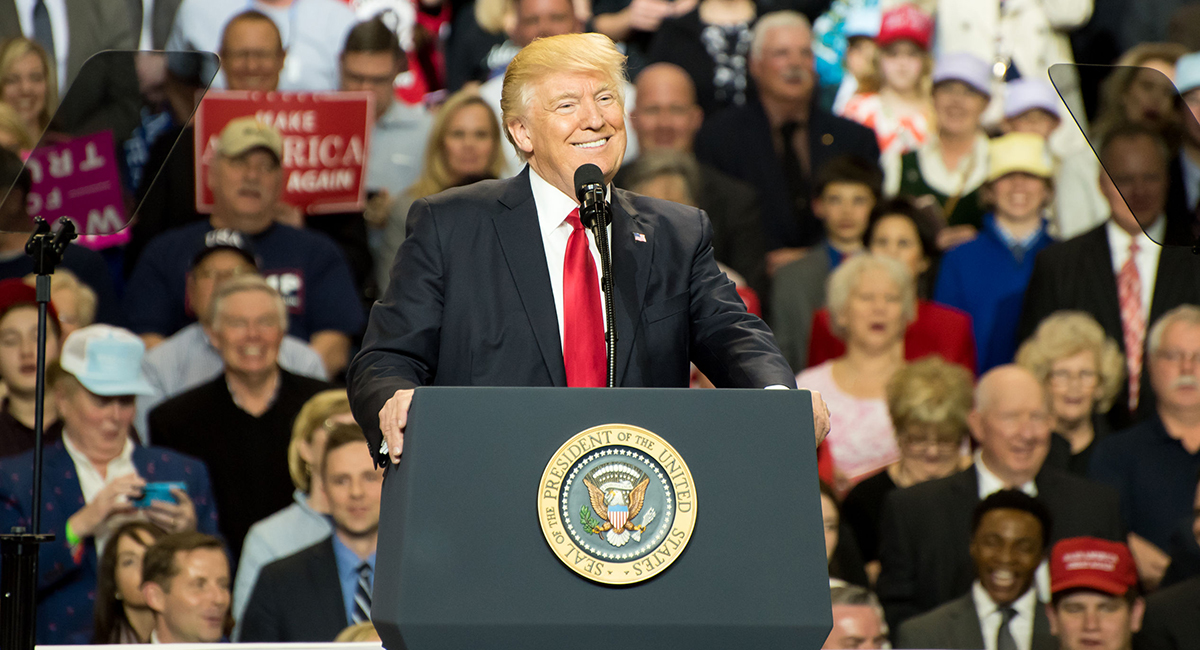Ronald Reagan’s wisdom often went unappreciated in his day. In a 1982 address to the British Parliament, he presented a strategy to confront Soviet communism and other forms of dictatorship by championing American values. Commentators deemed it “naive” and “wishful thinking”—not to mention dangerous—to talk of advancing American principles and ideals. Why provoke hostility by trumpeting the superiority of democracy?
This Monday President Trump gave a speech outlining his National Security Strategy. Like Reagan 35 years ago, Mr. Trump celebrated the U.S. as a force for good in the world and cited America’s founding values as a powerful advantage against repressive regimes. The NSS document, which the White House released the same day, asserts the administration’s determination to protect American sovereignty by “defending the institutions, traditions and principles that allow us to live in freedom.” It identifies America’s fundamental source of strength: “we the people.”
Those expecting a more isolationist approach or a retreat from global engagement, especially with regard to championing American values such as democracy and individual rights, may be wondering whether Mr. Trump’s fundamental outlook has changed. What they need to understand—and the NSS makes clear—is that in today’s brutishly competitive world, in which rivals are actively seeking military, economic and political gains at U.S. expense, the American idea still reigns as the nation’s greatest competitive asset.
Prior administrations have used the NSS document primarily as an internal plan for coordinating policies among government agencies and departments. That Mr. Trump chose to present its key points directly to the public shows that he recognizes the global appeal of the American model of governance. Acknowledging that “we are not going to impose our values on others,” the document nevertheless affirms that the U.S. “will encourage reform, working with promising nations to promote effective governance, improve the rule of law, and develop institutions accountable and responsive to citizens.”
No one would accuse Mr. Trump of mushy sentimentalism when it comes to foreign policy. If he now embraces America’s founding principles as an advantage in the global arena, it is because he understands the potency of success as a countermeasure against ideologies hostile to freedom. He appreciates the value of a good brand—and America’s trademark represents the values that distinguish it from authoritarian regimes that treat their citizens as expendable.
The NSS document provides an operational blueprint for addressing specific threats to the U.S. and its citizens. It lays out four basic “pillars” aimed at protecting the homeland, promoting American prosperity, preserving peace through strength, and advancing American influence in the world. That last pillar defines the moral impact of America’s presence in the global arena—and how it redounds to the nation’s benefit by enhancing the prospects for peace and prosperity in the long run.
“The extraordinary trajectory of the United States from a group of colonies to a thriving, industrialized, sovereign republic—the world’s lone superpower—is a testimony to the strength of the idea on which our nation is founded, namely that each of our citizens is born free and equal under the law,” the document states. “America’s core principles, enshrined in the Declaration of Independence, are secured by the Bill of Rights. . . . Liberty, free enterprise, equal justice under the law, and the dignity of every human life are central to who we are as a people.”
Reagan’s speech 35 years ago called on democratic nations to join in reaffirming the power of ideas to change the world for the better, reminding their citizens to think of themselves as “free people, worthy of freedom and determined not only to remain so but to help others gain their freedom as well.” Wars initiated by tyrants had devastated whole continents; the best way to fight totalitarianism and its terrible inhumanity was by actively promoting freedom and democratic ideals.
Two years later, on the 40th anniversary of D-Day, Reagan noted at Normandy that the men who fought there had faith that what they were doing was right, faith that they fought for all humanity: “You all knew that some things are worth dying for. One’s country is worth dying for, and democracy is worth dying for, because it’s the most deeply honorable form of government ever devised by man.”
Mr. Trump’s National Security Strategy aims to rebuild U.S. economic and military strength. The goal is to keep the peace, so that soldiers will not have to make the ultimate sacrifice to defend America’s vital national interests, its principles and its way of life. But as the world has learned, to great sorrow and loss of life, there are no guarantees. “We know that American success is not a foregone conclusion,” Mr. Trump said Monday. “It must be earned and it must be won.”
Or as Reagan put it in 1982: “No, democracy is not a fragile flower. Still it needs cultivating.”









